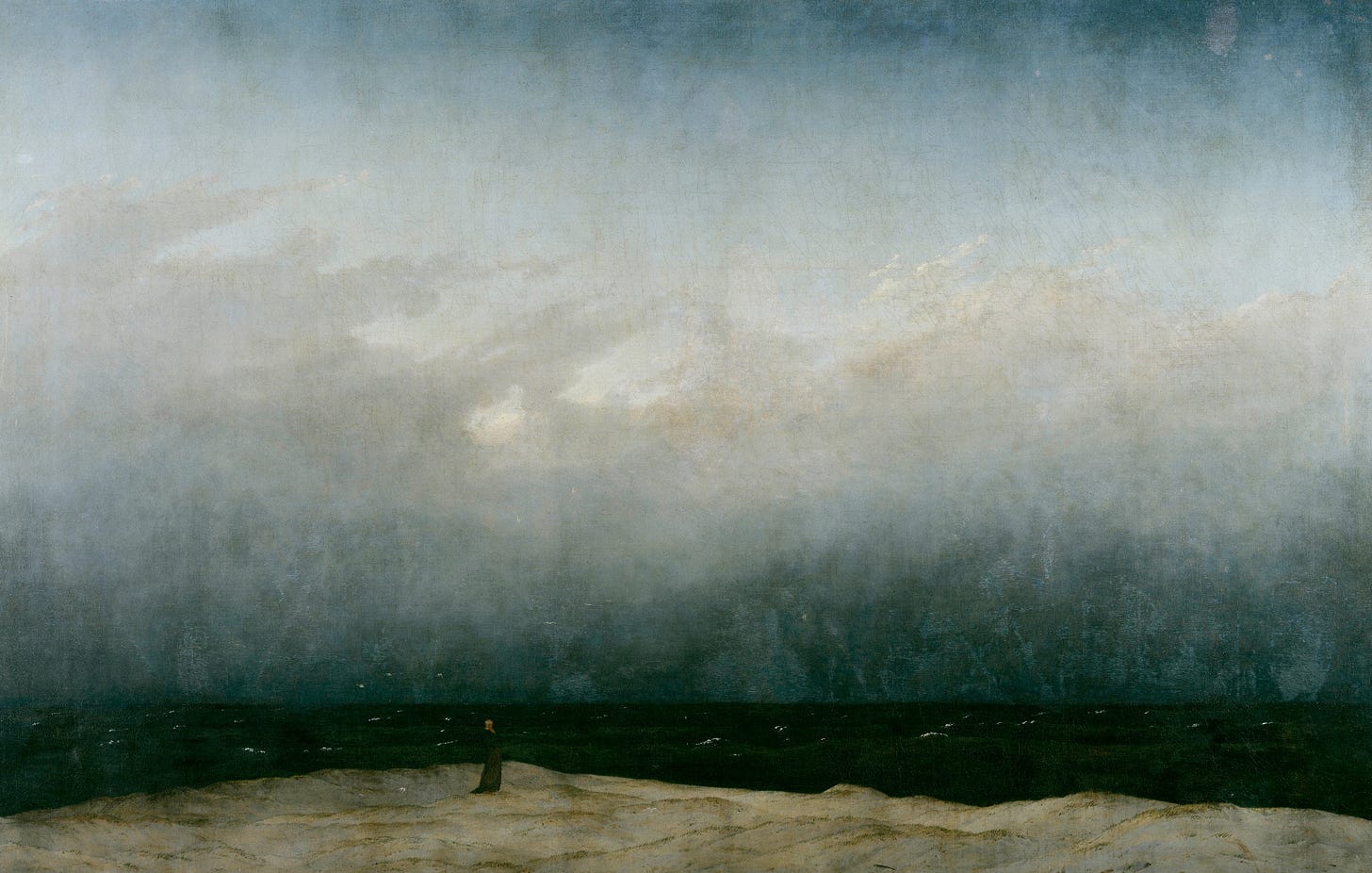Selected poems
A sheaf
The other day, I received in the mail a copy of classicist Paul Kosmin’s study of The Ancient Shore, from Harvard University Press. I was keen to receive it, not just for its own sake—it looks to be a fascinating study of what a friend of mine described as the primal scene of conflict: the land vs. the sea—but also because it contains, as an epigraph to its final chapter, a poem of mine: “Rathlin Island.”
I reproduce that poem, together with some others that might speak to it, in the sheaf below.
Update 3/15/25: I will be reading some of these poems, along with other, previously unpublished ones, online on March 30 at 7pm for Interintellect. Obtain your free tickets here.
INCARNADINE Born from snow, the stream fell down the mountain. It crashed up above from ledge to ledge then slid across black rock that lent it color. It gathered in a rippling pool. Where it went then we couldn't say. It burned its way into the earth somewhere below. It came up rosy in our hands and fell out clear. Later I put my hand where your collarbone splits apart. I said, this, this. Call it what it is. We drank black water from the mountain stream.
RATHLIN ISLAND Here, where field drops to sea, where big applause, beginningless, of surf and gulls drowns the fledgling speeches fluttered from the stage our entrance made this gray-green into: properties and features turn to charges that our presence is assertion, groundless, unconfirmed by rocks and waves that turn aside their gaze or merely stand. A man might fall. A bird falls a fall, grasping strands of world we cannot, threading world into world as loosened from one place, anchored to prey, it bends, taking itself under what its seeming rupture takes away: what sudden wave-trough surface might have returned a face.
BREAKWATER Like a frenzied bird, your scarf, flapping with a blank check’s hysteria, snatches your smile and scatters it across water flashing bright white teethmarks left by the wind nipping with playful malice. I did not bring you here to find things magnified, the world strangely diminished. So I said, or should have, where that bird struts on its plinth of shade and the river, sluggish, sinks amid torpid ripples slapping varnish after varnish over the sand. Did you share that water’s shiver, turning a cold shoulder in sleep? Over the breakwater, a glossy flank suggests itself again, like something you remember thinking you might… No. September’s light will banish itself and, soon, these forms, these stark remains and wastages, will seem to have been waiting for us, and we, also, to have been waiting for us, where further back in that slipping off, that stepping forth, spaced-out walkers scuffing the lean ice-dunes, we walked, bundled into an alternate nudity, under a blank sky.
ETYMON I followed significance down the tree branching through dreams and found only a broken seed opening into hope of its strange recovery only not return in the fruit of the tree. I rose from the roots and saw the only fruit above me angled into sunlight now, now shade as the tree swayed. I took and bit into it and found the next tree only. Do all the ways one digs turn into alleyways? Always the tree turned out to recede from me, the only other there, with one tree and one alone to inquire into.
TRISTAN AND ISOLDE Now neither leads and neither follows: home Is out of sight and mind for them, for them Whom nothing severs, heaven's copper dome, Green as the grass, restrains the rusting storm Still massing itself; now nothing is divided. When it has rusted through, heaven will bleed Homeward, scouring trails the light will slide Down to the last, least shoot of grass, or blade
SCENE FROM A LATE COMEDY I name her, below, what I did not, above: My love, my love, my love, my love, my love.
SHAKESPEARE'S SONNET V (retranslated from the German of Paul Celan) They, that first formed the glance where glances rest, that worked it from what's gentlest: the hours —: they're coming back, to do another thing: they founded, now they level to the ground. Is summer? Summer was. Already time leads onward into winters and eclipses. Leaf greened, sap climbed . . . At one time. Oversnowed beauty. And bareness, stripped-down, everywhere. Then, did not summer stay behind in glass as summer's ghost, extracted and imprisoned: beauty were not, were orphaned of all sense and unremembered and long since departed. But so, as spirit, shapeless, stored away, it lasts, the flower, further, winterhard.
An earlier version of “Shakespeare’s Sonnet V (retranslated from the German of Paul Celan)” appeared in AGNI. I first encountered Celan’s translations of Shakespeare either in Leonard Olschner’s 1988 essay “Anamnesis: Paul Celan’s Translations of Poetry” (ACTS: A Journal of New Writing 8/9) or in John Felstiner’s critical biography, Paul Celan: Poet, Survivor Jew (Yale UP, 1995), both of which single out Celan’s Sonnet V for special praise. Felstiner’s commentary on Celan’s Shakespeare translations (205-212) presents his own retranslation of Celan’s Sonnet V (207-208). My own attempt at retranslating hence owes a basic debt to Felstiner’s attempt; our versions, inevitably, overlap. That said, I remained dissatisfied with Felstiner’s rendering, and my effort is the product of this dissatisfaction. Whether it is true, as Olschner has suggested, that “Of all Shakespeare sonnets in Celan’s translation, that of the fifth sonnet is characterized pre-eminently, not by the grinding friction resulting from unresolved textual resistance, but rather by a sovereign idiom deeply rooted in Celan’s poetry” (82), I am not sure. I am inclined to say that such “grinding friction” is the “sovereign idiom” of Celan’s poetry, and this—winterhard—is what I have tried to preserve.
Others of these poems have previously appeared in Prelude (“Breakwater”), Berfrois (“Etymon” and “Tristan and Isolde”) and Hobart (“Incarnadine”).

